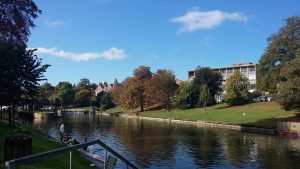Paris – Cambridge – Paris: a Megakaryocyte story
Posted by AlessandroDonada, on 14 November 2016
The first news came as a shock: so the British Railways are not always perfectly on time? For an Italian, that was a massive cultural shock. The second one was even more surprising: English weather is not that bad; actually, it is better than Parisian weather. But still, I was unable, on the train from Paris to Cambridge, to stop thinking about how exciting it will be to spend some time in a new lab and discover (brace yourself for the jargon) how to properly forward program induced pluripotent stem cells (iPSCs) into megakaryocytes (MKs).
I am Alessandro, a graduate student in Dr. Hana Raslova’s lab and I am currently trying to model and study the pathological mechanism of an inherited platelet disorder associated with a predisposition to develop leukemia. In our lab, we developed several iPSC models for haematological
Guided by the amazing Dr. Thomas Moreau, I was able to achieve this task and see myself the efficient conversion of my iPSCs into megakaryocytes, although some of them did not particularly appreciate the short stint in England and decided to proliferate less efficiently than the usual! Nonetheless, the time in Cambridge was incredibly fruitful: the folks there really helped me to blend in the lab and we had interesting conversations about our work and the different approaches; we also shared some enjoyable time off, listening to the Dr. Ghevaert’s skilled execution of some piano classics! And last but not least, Cambridge is such a lovely town, full of history and beauty, a pleasant alternative to the urban complexity of Paris.

I am really grateful to The Company of Biologists and the journal Disease Models and Mechanisms for their crucial support during this short stay. I hope that more young scientists will continue to benefit from your generous support. Many thanks to the entire Ghevaert’s team for hosting and a big merci to Thomas Moreau for his patience and all the scientific discussions we had.


 (3 votes)
(3 votes)